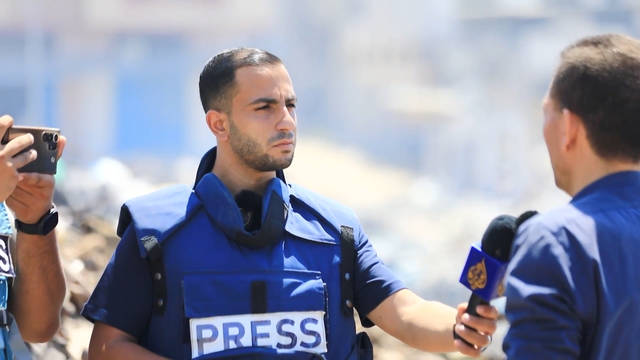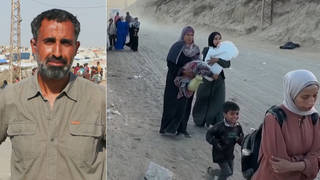
By Amy Goodman & Denis Moynihan
“If these words reach you, know that Israel has succeeded in killing me and silencing my voice.”
Those were the words circulated on X and voiced on-air by Al Jazeera, of Anas Al-Sharif, a 28-year-old journalist in Gaza, after he was killed in an Israeli airstrike on August 10. Anticipating his death, he wrote his statement last April.
“I have lived through pain in all its details, tasted suffering and loss many times, yet I never once hesitated to convey the truth as it is, without distortion or falsification, so that God may bear witness against those who stayed silent and accepted our killing. Do not forget Gaza… And do not forget me in your sincere prayers for forgiveness and acceptance.”
Anas al-Sharif, a correspondent for Al Jazeera Arabic, was one of the most prominent journalists still working in northern Gaza, covering Israel’s ongoing siege and assault. He was killed along with his fellow Al Jazeera correspondent Mohammed Qreiqeh, cameramen Ibrahim Zaher and Mohammed Nufal, and freelance media workers Moamen Aliwa and Mohammed Al-Khaldi when Israel bombed their press tent, located just outside Al-Shifa Hospital in Gaza City.
The Israeli military released a statement confirming its responsibility for the attack, falsely claiming Al-Sharif was a Hamas “cell leader.” Israel had long been threatening Anas Al-Sharif, prompting Irene Khan, the United Nations Special rapporteur on freedom of opinion and expression, to issue a statement on July 31, just 10 days before Al-Sharif’s assassination. The statement read in part, “Online attacks and unfounded accusations by the Israeli army against Al Jazeera journalist Anas Al-Sharif are a blatant attempt to endanger his life and silence his reporting on the genocide in Gaza.”
Speaking on the Democracy Now! news hour two days after the murder of Anas Al-Sharif and the other journalists and media workers, Irene Khan said,
“Anas actually contacted me, and Al Jazeera contacted me, to tell me of this impending threat on his head. They had seen it before. He’s not the first one. There are some 26 to 30 journalists who have been targeted in this campaign of assassination. Anas wanted me to go public, he wanted others to go public, to stop what Israel was doing.”
Mohamed Moawad, Al Jazeera’s managing editor, told Democracy Now!,
“The pattern is clear: degrading, delegitimizing, smearing, and then killing, justifying the killing by unfounded allegations. … Anas and Mohammed were the voices you heard from Gaza’s shattered streets, the steady tune that made chaos comprehensible, the eye behind the lens catching all the details to the world from Gaza City. They were the only two prominent voices left in Gaza.”
The timing of the assassination is key. They were among the last journalists in northern Gaza, prepared to report, at enormous personal risk, on Israel’s renewed invasion of Gaza City to depopulate the city of 1 million Palestinians, forcing them farther south.
Since October 2023, Israel has banned the international press from Gaza. On Sunday, Israeli Prime Minister Benjamin Netanyahu addressed reporters at a news briefing, saying, “I’ve ordered and directed the military to bring in foreign journalists, more foreign journalists, a lot.” Of course, if allowed in, reporters who embed with the IDF will be restricted in what they see, and their coverage released only after being approved by Israel’s military censors.
Addressing the reporters, Netanyahu added, “There’s a problem of assuring security, but I think it can be done in a way that is responsible and careful to preserve your own safety.” Hours later, the Israeli military murdered the Al Jazeera team.
Israel’s attack on Gaza has been the most deadly conflict for journalists and media workers in the modern era, anywhere in the world, with over 200 killed since October, 2023, with others injured or arrested. Palestinian journalists face similar risks of Israeli military and settler violence in the occupied West Bank, as evidenced by the army’s targeted killing of Al Jazeera’s renowned correspondent Shireen Abu Akleh, a U.S. citizen, in Jenin on May 11, 2022.
“Anas and Mohammed’s voices aren’t silenced,” Al jazeera’s Mohamed Moawad said. “The truth that they have been carrying to the world since the beginning of the war will echo in our coverage. We will continue the coverage.”
Israel’s violence against journalists is just one component of the ethnic cleansing underway in Gaza. None of the violence would be possible without the ongoing support of the U.S. government. It is crucial that U.S. media workers join their colleagues around the world, demanding unfettered access for international journalists into Gaza, an immediate end to Israel’s killing of Palestinian journalists, and that those responsible be held accountable.











Media Options